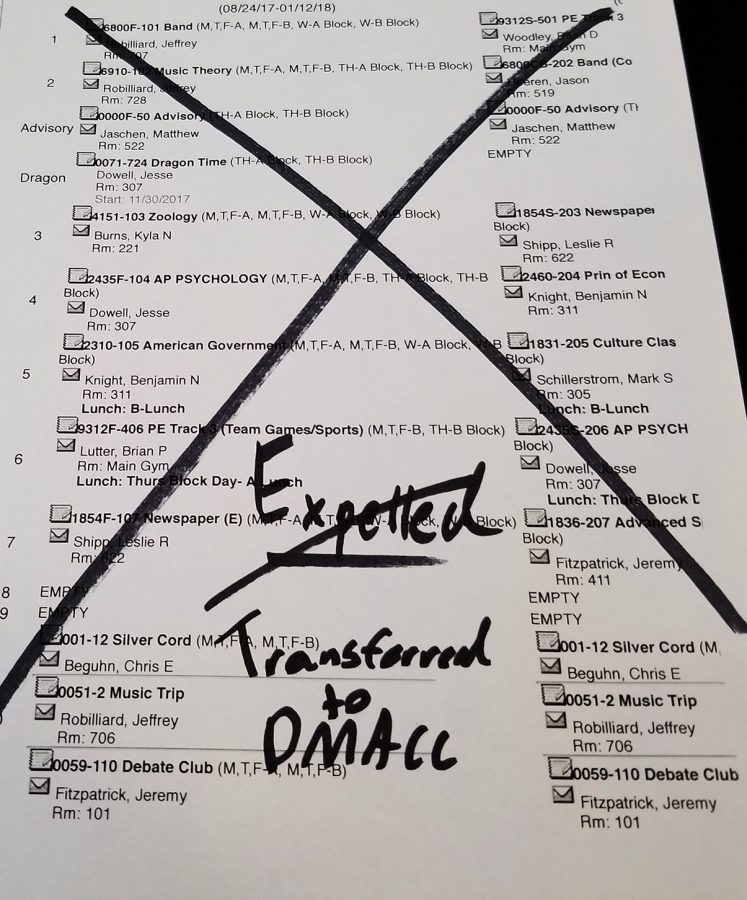In lieu of expulsion
December 1, 2017
Once in a while word goes around that a student has been expelled from school. Technically speaking, most students are not kicked out. Some of them experience what is called transferred in lieu of expulsion. This means that rather than expelling the student, the school and the student come to an agreement resulting in the individual facing an alternative other than expulsion. This is for the lesser infractions that have the potential for expulsion.
One alternative is to attend a DMACC program called HiSET or High School Equivalency Test. The program runs in eight-week cycles with classes held several days a week. Attendance is mandatory or the student has to start over. At the end if the student passes tests in social studies, math, writing, science, literature and arts; they earn a Johnston diploma. This program replaced the GED.
Expulsion is not a common occurrence in the district Associate Superintendent Bruce Amendt said. Rather, students are generally transferred in lieu of expulsion. Amendt said that the school does not have any historical record regarding prior expulsions or students in lieu of expulsion.
Meredith Case, ’18, a student who attended the high school last year was transferred to HiSet when she became in lieu of expulsion for offenses such as skipping school and failing classes.
It is important to keep in mind that the district cannot comment on private cases regarding expulsion or students in lieu of expulsion, and thus, could not comment on individual students for this article.
Case was not aware that any of her actions would lead to an expulsion or a transfer in lieu of an expulsion. “I wasn’t breaking any laws, I wasn’t fighting anybody at school, so I didn’t do anything that I thought would lead to expulsion,” Case said. “The main reason I was kicked out was for insubordination because I wouldn’t follow dress codes, and for not going to my first, second or P.E classes.”
The school district prioritizes helping struggling students rather than expelling them without any interventions. “Sometimes they need help and they can go through Unity Point Health Student Assistance Program,” Associate Principal Randy Klein said.
While many infractions are open to negotiation or compromise between the district and the student, there are also specific infractions that lead directly to an expulsion with zero grounds for compromise. Possession of weapons, drugs, or distribution of any of these will lead to an almost definite expulsion Klein said.
Case was facing issues within her own personal life and felt like she was not getting any support or help from administration or the counselors. She wanted to go to an alternative form of education that would help her succeed in her education. “I had a lot of family issues that they didn’t necessarily deal with or help me out with,” Case said.
Although Case’s struggle led to her performance in school suffering, she recognizes the way she dealt with her scenario is not beneficial for most people. “I always tell my friends ‘go to school, regular school is better for you,’ I think kids should try as hard as they can at school, but I had so many personal things going on that school wasn’t my first priority,” Case said.
Case is ultimately satisfied with the resources her new school is providing in comparison to Johnston. “They (high school) like to make it seem like they do a lot, and they do have resources and things, but they don’t push kids to use them,” Case said.
Case felt that Johnston’s services were not beneficial to her or the other students. “There’s a lot of messed up things stuff that goes on, then when it happens, Johnston’s like ‘wow, should’ve seen that coming! Let’s have therapy for two days then forget about it’,” Case said. “That’s all it really comes down to in Johnston, they only step in when its too late.”







